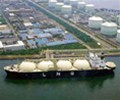

India’s biggest LNG importer Petronet LNG is open to extending the existing long-term contract with Qatar’s RasGas beyond 2028 to secure uninterrupted supplies to user industries such as power, fertilizers, and city gas distribution in Asia’s third-largest economy, company officials said Aug. 18.
They also said Petronet LNG favors a long-term contract for LNG supplies over spot deals.
Petronet LNG’s existing term supply contract with RasGas, slated for a review in 2023, will expire in 2028.
“We are keen to extend the term contract by at least 10 years to 15 years after the expiry of the existing contract to ensure supplies to user industries,” said V.K. Mishra, director finance, Petronet LNG.
Mishra said sourcing LNG cargoes via long-term deals are always a preferable route than sourcing via spot deals where LNG prices are subjected to wide swings.
Petronet LNG buys 7.5 million mt/year from RasGas via a long-term agreement and also imports 1.44 million mt/y from Exxon’s Gorgon project in Australia under another term deal.
Mishra termed the prevailing spot prices of around $17/MMBtu to be “very high” and “not sustainable” on a long-term basis as long-term oil-linked prices were almost half in comparison. “Long-term prices are the need of the hour and required for the industries we are supplying,” he said.
Qatar would continue to be a preferred destination to source LNG supplies under a term deal, Mishra said. Petronet LNG buys around 10 to 12 cargoes from Qatar under the existing term deal, depending on the domestic demand scenario. It buys an equal number of cargoes via spot deals in case prices are competitive.
“A price of around $10/MMBtu appears to be sustainable as domestic power companies shy away when this price level is breached,” said an official with the oil and gas ministry said separately.
India has an ambitious consumption target for natural gas in sync with Prime Minister Narendra Modi’s target of raising the share of gas in the overall energy mix from the current level of 6.3% to 15% in 2030.
“Long-term pricing is a prudent policy to ensure supplies to our big consumers like power and fertilizer plants,” Mishra said.
Officials said Indian companies have also rescheduled or deferred LNG cargoes to avoid the current prevailing high spot prices.
Source: Platts